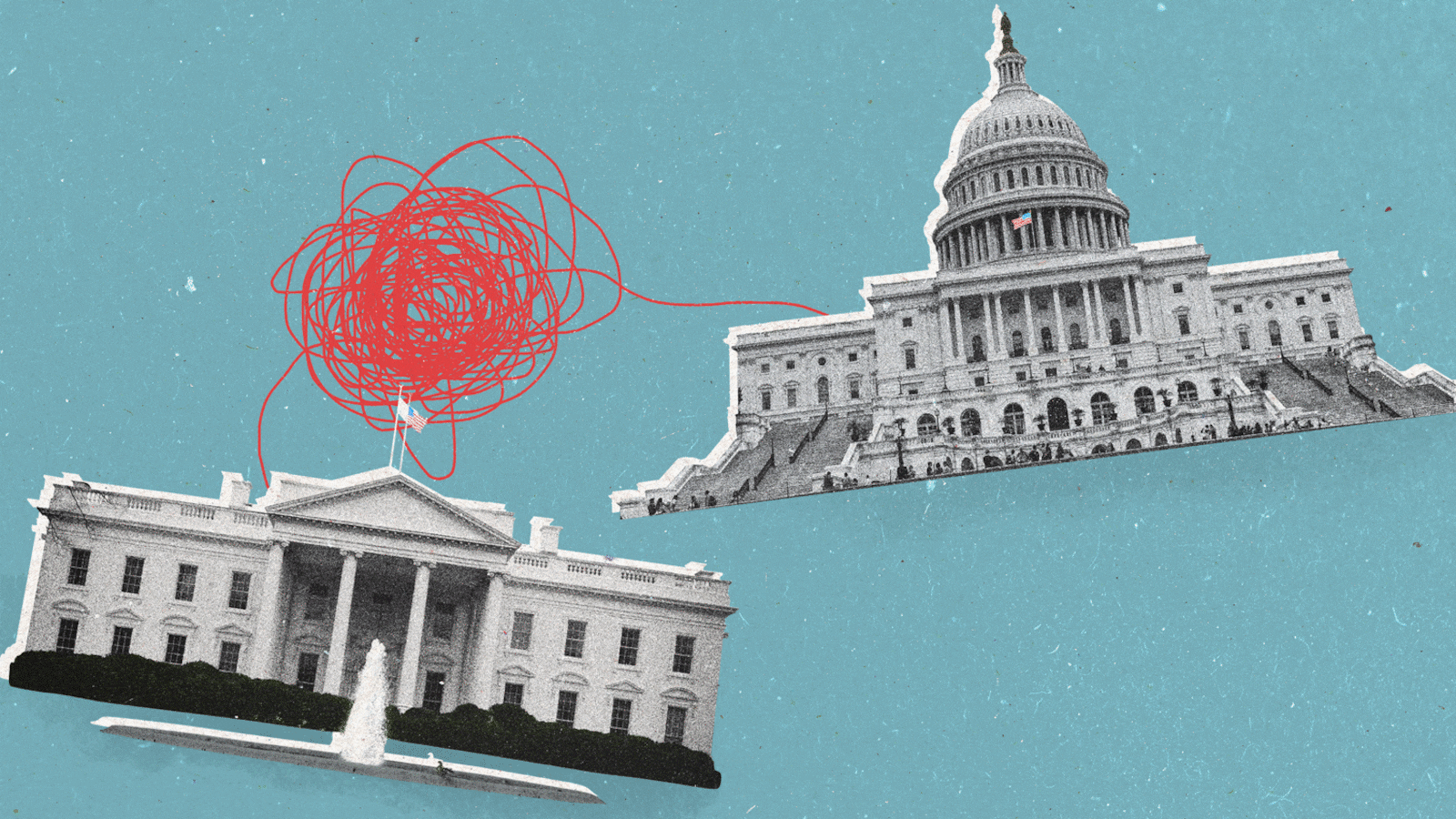As Donald Trump tries to pass legislation to fund the government and finance the construction of a border wall, the problem he’s encountered on Capitol Hill is not that his powers of persuasion are lacking. It’s that it appears he’s barely trying at all.
According to numerous Hill sources, both the president and his team have done remarkably little to try and win over votes for the administration’s proposal to include more than $5 billion in wall funding as part of a bill to end the government shutdown. Trump has ventured down Pennsylvania Avenue to meet with Republican leadership and had lawmakers at the White House, though sometimes just to leave abruptly. On Wednesday, he hosted a group of centrist-minded House Democrats to discuss the impasse.
But beyond that, his fingerprints have been largely missing on the legislative process.
Rep. Sean Patrick Maloney (D-NY) laughed when asked whether the White House had reached out to his office. “You’d think they would since I’m from a Trump district,” he said. “I guess I didn’t make the cut.”
Rep. Ron Kind (D-WI) said his office hadn’t heard from the White House for at least six months, but noted the president’s staff has turned over since then.
“I don’t even know who is assigned to my office in the White House, that’s how bad their outreach team is,” he said.
In fact, only two of the Democrats from districts Trump won in 2016 contacted by The Daily Beast said the White House had reached out for a meeting. Reps. Tom O’Halleran (D-AZ) and Josh Gottheimer (D-N.J.), members of the bipartisan Problem Solvers Caucus, were invited with other members of the group to the White House on Wednesday for a meeting between the president, the vice president, and his aides. O’Halleran didn’t end up attending. Gottheimer did and described it as “productive” but declined to give details about what solutions were discussed.
“My impression was that we had a productive conversation, and I think we both agree that there is a way forward here and it starts with both sides talking to each other,” he said.
While the president’s outreach to House Democrats has been slim, his attempts to win over Senate Democrats have been almost non-existent. None of the Democratic Senators who hail from states Trump won in the 2016 election said that they had heard from him or his staff.
“Senator Tester has not spoken with the President,” a spokesman for Montana Democrat Jon Tester said, “nor have any White House officials reached out to discuss a solution to the shutdown with his office.”
“Neither President Trump, nor his senior staff, have reached out to Senator Casey for any conversations,” said John Rizzo, a spokesman for Sen. Bob Casey (D-PA).
“Not a word,” said a spokesperson for Sen. Tammy Baldwin (D-WI). “The White House has not reach out to our boss,” a spokesperson for Sen. Debbie Stabenow (D-MI) added.
“The White House has not reached out to our office for a meeting regarding the shutdown,” said Zade Alsawah, a spokesman for Sen. Gary Peters (D-MI), “which the Senator repeatedly has called for an end to immediately.”
“Nope,” Sen. Doug Jones (D-AL) told The Daily Beast when asked if he’d heard from the president.
A spokesperson for newly elected Sen. Kyrsten Sinema (D-AZ) declined to comment. A spokesman for Sen. Joe Manchin (D-WV) told The Daily Beast that the senator had heard from the president’s son-in-law, Jared Kushner, about a week-and-a-half ago. But the aide characterized it as “a courtesy call” and a “brief conversation.”
The inability of Trump and his team to effectively move Democratic votes on the wall stands in stark contrast to the reputation that the president struck—both during the campaign and his early months in office—as the consummate schmoozer and deal-maker. And it has had a profound impact on the course of the current shutdown, which is the longest in U.S. history. Unable to move Democratic votes, Trump has been left in an increasingly difficult political position: unable to show momentum for his preferred legislative outcome and shouldering much of the blame in public opinion polls for keeping the government closed.
Aides and advisers to the president maintain that Democratic recalcitrance, not poor Hill outreach, is the underlying reason a shutdown resolution hasn’t been reached.
“They met with Democrat staff, the vice president did, his [and Trump’s] door is open, he’s been up to the Hill… I know they’ve been reaching out, but since when do senators have to be sitting around like schoolgirls waiting to be asked to dance?” former Rep. Jack Kingston (R-GA), a current Trump surrogate, said. “They’re grown adults, they can call the president and the White House,” he said. “It’s a two-way street. You can’t just sit in your corner.”
However, some close to Trump do concede that he and his team’s internal tumult has harmed its ability to operate on the Hill. “The way the invitations have been extended is more a function of the chaos than a lack of true desire to get Democrats to participate,” a former senior White House official said. As evidence of that tumult, Kingston told The Daily Beast that he was going to the Hill on his own accord—and not at the instruction of the White House—on Wednesday to meet with “a couple freshman” Republican lawmakers about the shutdown.
Trump and his senior staff have attempted to alleviate some of the discord by hosting surrogates at the White House to coordinate strategy and messaging. Last Monday, an array of supporters spent roughly an hour and a half meeting with Vice President Mike Pence in the Roosevelt Room, during which Trump joined for about 45 minutes to discuss the government shutdown, according to two people who attended. And in the subsequent days, attacks against Democrats for being absent from negotiations have grown noticeably more aggressive.
But those efforts have not yet had a demonstrable effect. If anything, Hill aides say, they’ve shown a misunderstanding of the opposition, with White House officials wrongly predicting that they could divide Democratic leadership over border wall funding and miscalculating that House members would get frustrated by having their agenda overtaken by talk of the shutdown.
All the while, the center of the debate has moved away from the president. Instead of building momentum in the Senate by flipping Democrats and getting closer to the 60 votes needed to move border wall funding through that chamber, the opposite has occurred. A number of Senate Republicans have publicly encouraged Trump to open the government for a short period of time during which lawmakers would negotiate over the wall—a position the president has vehemently rejected because, as he’s stressed privately, it would sap whatever political leverage he has.
In the House, meanwhile, Speaker Nancy Pelosi’s (D-CA) grip on her caucus appears to be growing tighter. On Tuesday, a group of moderate House Democrats that the White House was hoping to pitch on border wall funding turned down invitations to have lunch with the president. And on Wednesday, Pelosi informed Trump that his State of the Union address would no longer take place on Jan. 29 if the government remained closed.
Fellow Democrats said she was universally well received in the caucus meeting when she alerted members about the rescinded invite. One House Democrat gleefully predicted that it would enrage the president by depriving him of a primetime audience. Another responded to a text about Trump being livid with a smile emoji.









